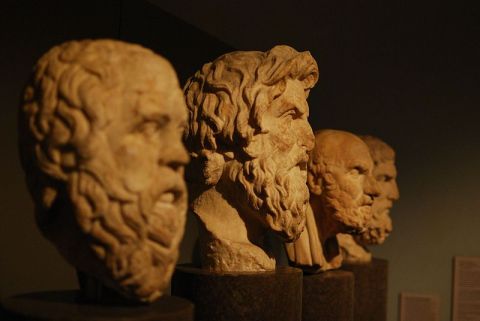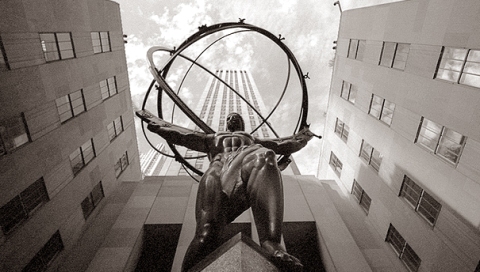On Paradoxes and Silence
February 26, 2013 § 2 Comments
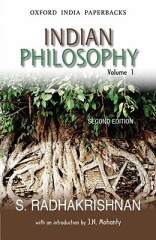 Indian Philosophy Volume I (Radhakrishnan, Sarvepalli)
Indian Philosophy Volume I (Radhakrishnan, Sarvepalli)
I took nearly two months to work my way through 700 pages of dense commentary summarizing the substantial philosophical outpourings of a sizeable population over a period of roughly 20 centuries. I took 16 pages of notes while reading, and then transcribed, edited, and sorted these notes into logical clusters. I am now tasked with converting all this material into a brisk and breezy blog post. This isn’t easy: I can only do this by glossing over most of the material, and sticking to broad impressions.
The first thought that comes to mind when I think about what I read in this book is a slightly incongruous vision, which goes something like this. A few centuries from now, when human progress has run its course and the world is bursting at the seams with sad, middle-aged, Facebook-obsessed reality show addicts, an alien armada will land on Earth and seize control of the planet. Unable to elicit much sense from the inhabitants, they will plug into the World Wide Web, which they will naturally assume is the legacy left behind by an older, wiser civilization. After years of careful examination, they will marvel at the religion and philosophy of these earlier Earthlings (for they will see no reason to believe that it was not a single religion, with millions of gods). It is a hugely eclectic religion, they will declare – one that incorporates and celebrates profound clarity of thought as well as the most ridiculous rituals and superstitions. These people were a paradox, they will say, some of them with scornful amusement and others with reverential awe; and they will wonder what happened to the Internet civilization, and who let the current lot take over.
Portrait of a Philosopher as a Historian
December 26, 2012 § 6 Comments
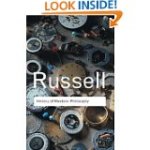 History of Western Philosophy (Russell, Bertrand)
History of Western Philosophy (Russell, Bertrand)
“In studying a philosopher,” Bertrand Russell tells us in this book, “the right attitude is neither reverence nor contempt, but first a kind of hypothetical sympathy, until it is possible to know what it feels like to believe in his theories, and only then a revival of the critical attitude…”
Fine, then. It is with sympathy that we will begin. Let us try to understand what it means for a philosopher to be writing, not an articulation of his own philosophy, but a general history of philosophy.
Should the definitive history of a nation’s literature be a subject left to its novelists and poets? Would the military history of the world, if written by a decorated general, ipso facto, be better than one written by a professional historian? I’m thinking: probably not. The skills required to write a poem and win a war are different from those required to formulate a cogent explanation of how people in other times wrote other poems, or won other wars. A good poet does not need to have read Milton, understood Eliot or even been able to identify a Shakespearean sonnet in a police line-up, and a victorious general may be blithely ignorant of the strategies employed by the armies in the battle of Karbala. This isn’t merely because knowledge in these subjects is not accretive in nature. A competent mathematician of today would be able to account for every mathematical fact between Pythagoras and Andrew Wiles, if not beyond; but even she would require months of additional study before being able to explain the processes by which the facts were accumulated, which is what history is about. What she would have ended up writing would be a math textbook. So of what value can a philosopher’s History of Western Philosophy be other than that of novelty? As it turns out, while I’m not sure Russell’s book is the best historical account of Western philosophy, I can confirm that it is a lively and absorbing discussion of Russell’s own opinions, and of his own philosophy. You will also find it wickedly funny in part, if bone-dry irony is what gives you the giggles:
Legend has much to say about Empedocles. He was supposed to have worked miracles…finally, it is said, he died by leaping into the crater of Etna to prove that he was a god. In the word of the poet: ‘Great Empedocles, that ardent soul/Leapt into Etna, and was roasted whole’.
Matthew Arnold wrote a poem on this subject, but, although one of his worst, it does not contain the above couplet…
Weighing the Odds
October 28, 2012 § 2 Comments
There is a myth about mythology: it is that a mythological story is timeless and that it has undiluted charm and relevance for people of all generations and geographies, everywhere and forever. In fact, legends frequently die – for want of people interested in reading them, thinking about them or passing them on to the next generation. Our lives and circumstances are so different from those of the heroes, heroines and gods who star in ancient mythological tales that the odds are heavily stacked against their survival.
But don’t weep yet for mythology – it has a couple of powerful things going for it. One is the number of genres it can be linked to. Of course fantasy and forms of children’s literature draw liberally from mythology, but so does serious writing. Albert Camus’ Myth of Sisyphus and Friedrich Nietzsche’s Also Sprach Zarathustra use powerful myths as pivotal points of their philosophy. Robert Graves and James Frazer intensely analyzed the linkages between mythology, history and sociology. Most religions are inseparable from their mythologies. Some of the most famous pieces of art, sculpture and architecture in the world have been inspired by mythological themes; the names of the planets, the days of the week, many of the months of the year – we cannot think or speak without making mythological references, to Oedipal complexes, Herculean tasks, halcyon days, basilisk stares, scapegoats and holocausts, the writing on the wall, adam’s apples, achilles’ tendons and heels…To destroy it completely would require the complete overhaul of language and thought. There is something elemental about myth. All else is derivative.
Jeanette Winterson, for example, uses the fairly straightforward myth of Atlas and Hercules to derive a deep truth about her own childhood, and from that to derive a universal truth about life. In between, she narrates the story one more time – in her own words, investing the old, familiar characters with personalities, words and thoughts of her own choice. But then that is the other powerful weapon mythology has at its disposal: at the end of the day, a myth is a bloody good story, just the type that story-tellers instinctively enjoy re-imagining, re-interpreting and retelling in their own words.
Winterson’s effort was part of the Canongate Myth series, a series of short novels in which a set of contemporary authors – Margaret Atwood, AS Byatt, Philip Pullman, Su Tong, Natsuo Kirino, and others – were invited to each render versions of an ancient legend of their choice. And this kind of periodic revisionism, of course, is precisely how mythology lives on, against all odds, from the ashes of the dying, discarded form of the same story, phoenix-like (see how this works?) I think it is a fantastic idea, and in my dream world, some day, I would like to something similar with the rich and complex mythology of my own country, India. Until then, I will try and read the other books in this series…
The Book of Uncertain Truth
September 25, 2010 § 8 Comments
Mathematics: The Loss of Certainty (Kline, Morris)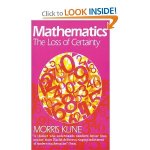

Logic creating Mathematics, or Mathematics creating Logic, or just a clever game on paper? (MC Escher, ‘Drawing Hands’, courtesy http://www.worldofescher.com)
“The supreme triumph of reason is to cast doubts on its own validity.”
– Miguel de Unamuno
The mathematics that I learnt in high school, over two decades ago, was a formidable fortress of certainty, through the sturdy bulwarks of which not a single wisp of doubt or flaw could ever hope to sneak. We knew things for a fact back then, some of which were the following:
- 1 + 1 = 2. Always. It was so before the first amoeba emerged in the primordial soup and it will be so when the last star boils away into nothingness, unwitnessed by sentient beings.
- People discovered mathematics the same way they discovered a great Chinese restaurant in the neighborhood, a boil in their armpit, a field of wild daffodils, or North America. It was there all along, we just happened to stumble upon it, but once we knew of its existence, we put it to very good use (except for the boil, of course, and quite possibly North America)
- Human affairs – love, religion, politics, biology, poetry – are non-mathematical and therefore, essentially unpredictable. This, we were taught, was a shame, and a critical shortcoming of these subjects.
- The physical world, on the other hand, runs on mathematical principles. This is simply so. We didn’t think to ask why. Unexplained physical phenomena remain unexplained only until the right mathematical model is found for them. It is merely a matter of time, and several ridiculously bright people are already working hard on these problems. « Read the rest of this entry »
The Book of Bombast and Bardolatry
August 29, 2009 § 1 Comment
Shakespeare: The Invention of the Human (Bloom, Harold)
“Literary criticism,” says Harold Bloom, quoting Dr. Johnson,”is the art of making the implicit finely explicit.”
Very well, then: let us, in this very light, critique Bloom’s own magnum opus. Of course, it is difficult for much to be left implicit in a 745-page tome; moreover, Bloom flaunts his likes and dislikes on his sleeve and leaves little to the imagination. However, there is something to be said for brevity, and so, here is a two-line summary of the book.
What Bloom does NOT approve of: TS Eliot, post-modernists, Marxists, feminists, structuralists, multi-culturalists, Ralph Fiennes’ Hamlet, nouveau historicists, George Bernard Shaw, people who direct Shakespearean plays these days, people who teach Shakespeare these days, people who don’t teach Shakespeare these days, most modern Shakespearean critics, and Peter Brook.
What Bloom approves of: William Shakespeare.
The End.
“Approves of” is a complete understatement, to be honest, and understatement is not something that is easily associated with Bloom. As a matter of fact, there are plenty of people that Bloom does approve of: AC Bradley, Hegel, Nietzche, Freud, Borges, Ralph Richardson’s Falstaff, Kierkegaard and so on – all dead and gone – but Shakespeare is his One True God, who can never die.
I cannot improve, therefore, on Bloom’s wry and apt description of himself, as “Bloom Brontosaurus Bardolator, an archaic survivor among Shakespeare critics“. He is perhaps the last in a distinguished list of idolators of the Bard, from Samuel Johnson to Coleridge and Carlyle, and so, if you are a theatre-goer or a student of English literature, you will find this book a perfect companion.
Bloom approaches his subject not only with slavish devotion, but also with consummate mastery and easy familiarity. What in Shakespeare is great? Why, his characters – Falstaff, Hamlet, Cleopatra, the Macbeths, Othello and Iago, Lear, Shylock and Richard III, of course, but also Richard II, Edmund and Edgar,Portia from the Merchant of Venice, even Faulconbridge the Bastard – characters who brood, evolve through the play, and as Bloom points out, listen to themselves. Forget the play – the characters must go on! It is in the explication of what makes these characters magnificent creations that Bloom excels himself, leafing through the 38 plays, picking out parts, pointing out lines, comparing, contrasting, educating – he is at once professorial in his pronouncements and childlike in his awe.
Does Bloom overstate his case? I am no literary expert, but I will arrange 11 quotes from the book in increasing order of the strength of the assertion, and you may decide for yourself the point where admiration ends and hyperbole begins.
11. “Shakespearean protagonists suggest unused potentialities that their plays do not require of them…they are more, much more, than what happens to them”
10. “Shakespeare’s characters are ‘free artists by themselves'” (quoting Hegel)
9. “Shakespeare psychologized us”
8. “…the representation of love, in and by Shakespeare, was the largest literary contamination that produced Romanticism”
7. “As much a creator of selves as of language, he can be said to have melted down and then remolded the representation of the self in and by language.”
6. “Shakespeare invented our feelings”
5. “To call Shakespeare a ‘creator of language’ as Wittgenstein did, is insufficient, but to call Shakespeare also … a ‘creator of thought’ is still not enough”
4. “…the time before Shakespeare had his full influence upon us was also ‘before we were wholly human and knew ourselves’” (quoting Wallace Stevens)
3. “I do not know whether God created Shakespeare, but I know that Shakespeare invented us, to an altogether startling degree.”
2. “…Shakespeare is a kind of mortal god, our instruments for measuring him break when we seek to apply them.”
1. “Shakespeare is an international possession, transcending nations, languages, and professions. More than the Bible, which competes with the Koran and with Indian and Chinese religious writings, Shakespeare is unique in the world’s culture”
While I definitely disagree with the last claim ( I have always thought Bloom unidimensionally Western, having read his Western Canon), he has now inspired me to bring out my old, trusty Collected Works, with a renewed pledge to read the Histories and the Tragedies. Bloom has told me what to expect, but as Italo Calvino has already warned me, in Why Read the Classics: “no book which discusses another book can ever say more than the original book under discussion”.
I suppose that says something about this blog as well. Hmm.

